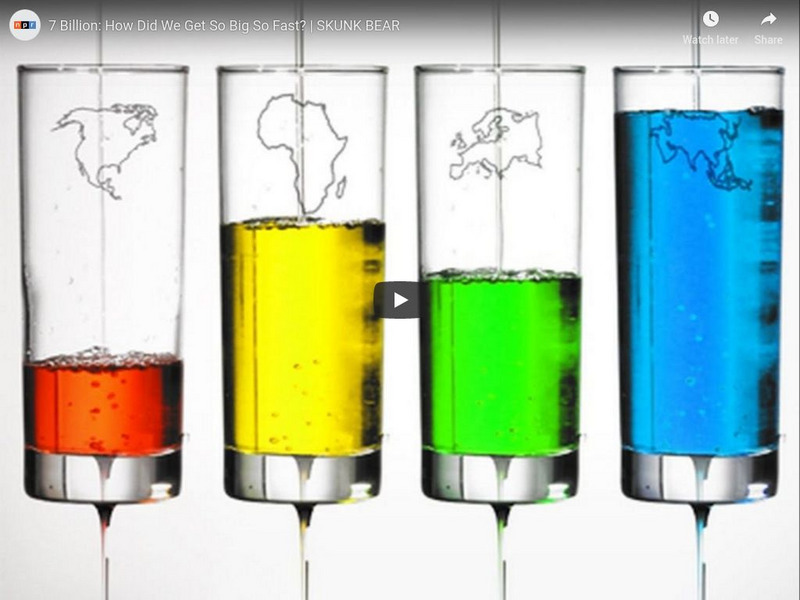Crash Course
The Modern Revolution Crash Course Big History 8
In which Hank and John Green teach you a Crash Course on the modern revolution, and the upside of the progress that humanity has made in the last 500 years or so. And while there are two sides to every history, and many of these changes...
TED Talks
TED: Where on Earth will people live in the future? | Parag Khanna
From the return of nomadic living to a climate-disrupted world, author and global strategist Parag Khanna has some predictions for humanity. Get a fascinating glimpse at the future as he tackles an urgent question: Where on Earth will...
TED Talks
Hans Rosling: Religions and babies
Hans Rosling had a question: Do some religions have a higher birth rate than others -- and how does this affect global population growth? Speaking at the TEDxSummit in Doha, Qatar, he graphs data over time and across religions. With his...
SciShow
Earth, Two Degrees Warmer
A new report on climate change is pretty grim, but there is still a little hope.
SciShow
Coming Soon: 12 Billion People on Earth
SciShow News explains the science behind the latest virus outbreak in the U.S., and examines surprising new predictions about the future of the world’s human population.
TED Talks
Hans Rosling: The best stats you've ever seen
You've never seen data presented like this. With the drama and urgency of a sportscaster, statistics guru Hans Rosling debunks myths about the so-called "developing world."
TED Talks
Marcel Dicke: Why not eat insects?
Marcel Dicke makes an appetizing case for adding insects to everyone's diet. His message to squeamish chefs and foodies: delicacies like locusts and caterpillars compete with meat in flavor, nutrition and eco-friendliness.
TED Talks
TED: Global population growth, box by box | Hans Rosling
The world's population will grow to 9 billion over the next 50 years -- and only by raising the living standards of the poorest can we check population growth. This is the paradoxical answer that Hans Rosling unveils at TED@Cannes using...
3Blue1Brown
Exponential growth and epidemics
A primer on exponential and logistic growth, with epidemics as a central example
Crash Course
Population & Food: Crash Course Geography
Today we’re going to talk about the link between population and food energy. As the world's population keeps growing, finding ways to provide enough food and water for everyone while supporting a sustainable environment can be tricky!...
Bozeman Science
Human Population Size
In this video Paul Andersen explains how the world population has undergone exponential growth since the industrial revolution. Predicting the future world population is difficult because each country will grow at different rates....
Bozeman Science
ETS2B - Influence of Science, Engineering and Technology on Society and the Natural World
In this video Paul Andersen explains how society influences the natural world through increasing science, engineering and technology. As the world population increases it will require more natural resources and it will impact the global...
Curated Video
MEDCs
How does a country come to be termed More Economically Developed? And why does this matter? Human Geography - A Changing World - Learning Points. More Economically Developed Country (MEDC) refers to a nation amongst the richest in the...
Global Health with Greg Martin
Hans Rosling on Global Health
On this episode, we sit down with doctor, academic, statistician and public speaker- Prof. Hans Rosling, the man who makes data dance! Hans reflects on important demographic changes and the implications for global health.
Weird History
Things You Didn't Know About Genghis Khan
Genghis Khan remains one of the most feared and respected conquerors of all time. His biography is shrouded in mystery and contradiction, but the facts about Genghis Khan are that he rose up from almost certain death on the Mongolian...
Institute for New Economic Thinking
Michael Spence: The Next Convergence (1/5)
India and China are set to converge to lifestyles and consumption levels similar to those enjoyed by the industrialized countries. The rise of these new economic giants puts enormous strain on the earth's biosphere. At the same time,...
Globalive Media
Beyond Innovation: Episode 16
A cyborg startup blends man with machine, an algorithm masters audio recordings and robots manage a vegetable garden. Plus, Anthony and Michael speak with a scientist pioneering batteries that are safe to eat. Hosted by venture...
FuseSchool
MATHS - Statistics - Pie Charts
Data… Nowadays information is being collected on everything… we have data coming out of our ears. These numbers might be showing us something very meaningful but who can really tell? This is where bar graphs and pie charts come into...
Bloomberg
FutureMap's Khanna on the New Economy
Bestselling author and FutureMap Founder and Managing Partner Parag Khanna discusses changes wrought by the pandemic. He speaks from the first morning of the Bloomberg New Economy Forum with Shery Ahn.
PBS
Nova: World in the Balance: Human Population and Global Trends
A companion site to Nova's film that examines "human populations and environments." Find some fascinating facts in the interactive slide shows "Human Numbers Through Time," and "Global Trends Quiz."
NPR: National Public Radio
Npr Videos: Skunk Bear: 7 Billion: How Did We Get So Big So Fast?
Just over two centuries ago in 1804, the global population was 1 billion. But better medicine and improved agriculture resulted in higher life expectancy for children, dramatically increasing the world population, especially in the West....


